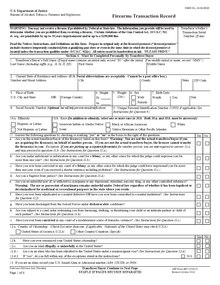
A Firearms Transaction Record, or ATF Form 4473, is a seven-page form prescribed by the Bureau of Alcohol, Tobacco, Firearms and Explosives (ATF) required to be completed when a person proposes to purchase a firearm from a Federal Firearms License (FFL) holder, such as a gun dealer.[1]
Form 4473 contains the purchaser's name, address, date of birth, government-issued photo ID, National Instant Criminal Background Check System (NICS) background check transaction number, and a short affidavit stating that the purchaser is eligible to purchase firearms under federal law. It also contains the make, model, or serial numbering the firearm. Lying on the form is a felony punishable by up to five years in prison[2] in addition to fines, even if the transaction is denied by the NICS. Prosecutions are rare in the absence of a felony committed with the gun purchased.[citation needed] Of 556,496 denied transactions between FY 2008 and FY 2015, federal prosecutors prosecuted an average of under 32 cases per year, including 24 in FY 2013, 15 in FY 2014 and 20 in FY 2015.[3][4]
If a person purchases a firearm from a private individual who is not a FFL licensed dealer, the purchaser is not required in most states to complete a Form 4473. All purchases of small arms (handguns) from private individuals from another state are required to have a Form 4473 completed before sale.[citation needed] Some states (such as California, Colorado, Nevada, New Jersey, Virginia, and Washington) require individual sellers to sell through dealers.
These forms are given the same status as a tax return under the Privacy Act of 1974 and cannot be disclosed by the government to private parties or other government officials except in accordance with the Privacy Act. Individual dealers possessing a copy of the form are not subject to the Privacy Act's restrictions on disclosure. Dealers are required to maintain completed forms for 20 years in the case of completed sales, and for 5 years where the sale was disapproved as a result of the NICS check.
- ^ See generally subsection (g)(1)(A) of 18 U.S.C. § 923 and subsection (a) of 27 C.F.R. sec. 478.124.
- ^ See subsection (a) of 18 U.S.C. § 922 and subsection (a)(1)(A) of 18 U.S.C. § 924.
- ^ https://oig.justice.gov/reports/2016/a1632.pdf [bare URL PDF]
- ^ "As gun ownership increases, prosecutions for lying to get a gun fall". 30 September 2016.